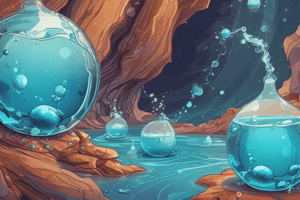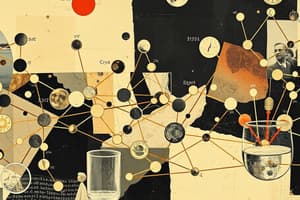Podcast
Questions and Answers
What is the most abundant compound in living things?
What is the most abundant compound in living things?
- Water (correct)
- Carbon dioxide
- Hydrogen peroxide
- Methane
Why is water considered to be an ideal biologic solvent?
Why is water considered to be an ideal biologic solvent?
- Because it can dissolve many substances (correct)
- Because it is highly acidic
- Because it has a high boiling point
- Because it is nonpolar
What type of molecule is water?
What type of molecule is water?
- Polar molecule (correct)
- Nonpolar molecule
- Ionic molecule
- Metallic molecule
What feature of water helps to attract other molecules?
What feature of water helps to attract other molecules?
What type of bonds give water many of its unique properties such as viscosity, surface tension, and boiling point?
What type of bonds give water many of its unique properties such as viscosity, surface tension, and boiling point?
At what temperature does water exist in its liquid state?
At what temperature does water exist in its liquid state?
Why do molecules with hydrogen bonds have higher boiling points than molecules that don't?
Why do molecules with hydrogen bonds have higher boiling points than molecules that don't?
What type of interactions cause non-polar substances like fats or oils to clump together when placed in water?
What type of interactions cause non-polar substances like fats or oils to clump together when placed in water?
Flashcards are hidden until you start studying
Study Notes
Water in Living Organisms
- Water is the most abundant compound in living organisms, playing a critical role in biological processes.
- Its unique chemical properties influence various biological reactions and structures.
Ideal Biological Solvent
- Water is considered an ideal biological solvent due to its polar nature, allowing it to dissolve a wide range of substances.
- The polarity of water enables it to interact with ionic and polar compounds, facilitating biochemical reactions in cells.
Molecular Structure of Water
- Water is a polar molecule, meaning it has a partial negative charge near the oxygen atom and a partial positive charge near the hydrogen atoms.
- This polarity contributes to water's ability to form hydrogen bonds.
Attraction of Molecules
- The polar nature of water molecules enables them to attract other polar substances and ions, aiding in solvation.
Unique Properties of Water
- Hydrogen bonds are responsible for many unique properties of water, including high viscosity, surface tension, and a high boiling point compared to other substances of similar molecular weight.
- These hydrogen bonds create a cohesive force among water molecules.
Liquid State of Water
- Water exists in its liquid state at a broad range of temperatures, specifically between 0°C and 100°C at standard atmospheric pressure.
Boiling Points and Hydrogen Bonds
- Molecules that can form hydrogen bonds typically have higher boiling points than those that cannot, due to the additional energy required to break these bonds during phase changes.
Non-Polar Substances in Water
- Hydrophobic interactions cause non-polar substances, such as fats and oils, to clump together when placed in water.
- The water molecules form a structured cage around the non-polar substances, minimizing their exposure to the polar solvent.
Studying That Suits You
Use AI to generate personalized quizzes and flashcards to suit your learning preferences.




